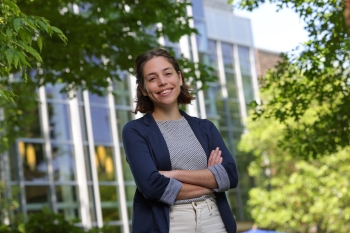Two graduates selected for Duke Law’s Farrin Fellowship
Lily Talerman ’23 and Ellen Goodrich ’23 were both student-attorneys in the First Amendment Clinic during their third year.
 Lily Talerman '23
Lily Talerman '23
Recent graduates Ellen Goodrich ’23 and Lily Talerman ’23 are the inaugural recipients of Duke Law School’s Farrin Fellowship.
Established by James Farrin ’90 and his wife Robin Farrin in 2021, the fellowship is awarded to graduating students that have displayed a strong focus on public interest work throughout their studies and professional learning experiences. Awarded annually, it is one of three year-long paid fellowships Duke Law offers that enable students to begin their careers working in a public interest position.
As students on the First Amendment Clinic, Goodrich and Talerman displayed enthusiasm for an area of law that is vitally important to society and culture, said Senior Lecturing Fellow Amanda Martin, the clinic’s supervising attorney, making her recommendation of them for the fellowship a “natural one.”
“Ellen and Lily’s characteristics and passion-forward approaches to practice are not always a given in this field. They are enthusiastic, passionate, and truly committed to their areas of interest,” said Martin. “There’s not always a profit motive to the public interest sector, but there couldn’t be anything more fundamental to the function of democracy. It really has to be a calling, and for Lily and Ellen, I believe it is. It’s another reason why the Farrin Fellowship is such a gift.”
The fellowship will lead Talerman to the Southern Coalition for Social Justice in Durham, where she will join the voting rights team in the nonprofit’s mission to protect and litigate the right to free and fair election processes.
The SCSJ, based in Durham, partners with communities of color and indigent communities to defend their legal rights in areas of focus that include voter protections, police accountability, racial discrimination in the criminal justice system, and school discipline policies.
“It’s a big time for voting rights. I’m excited to be doing this work leading into a presidential election; which I think that will be a unique experience,” said Talerman. “I’m also excited to get more invested in the South and the communities in North Carolina. I really want to dig in and make it more my home.”
A Massachusetts native set on planting firmer roots in the South, Talerman said she plans to take a community-oriented approach to voter protection work.
“I don’t want to be a lawyer that just makes decisions for people without considering their input or experiences. I feel like the clinics here at Duke have been really helpful for me to do that. The Southern Coalition also focuses a lot on community lawyering and partnerships. Combining those, I’ll be happy knowing that I’m letting community members lead and using the legal skills I’ve built at Duke Law to help them get there,” said Talerman.
Talerman also looks forward to strengthening her litigation skills throughout her fellowship in an area of law she’s long been passionate about.
“I worked on a campaign in between undergrad and law school. I was always interested in politics, so it has been a natural switch – especially to come into law school in 2020, another big election year. To have those campaign skills was a great first stepping stone to slot me into voter protection work,” she said.

Goodrich will join the Student Press Law Center, where she will work to educate student-journalists across the country on First Amendment, free speech, and press law.
The SPLC is a national organization based in Washington D.C. that is comprised of professional journalists, educators, lawyers, and students who are dedicated to the promotion, support, and defense of the First Amendment and press freedoms for high school and college journalists.
“I have a journalism background and I’m also very interested in education, so I’m excited to work with an organization that is a perfect mix of both and help students understand their First Amendment rights,” said Goodrich.
Goodrich will be based in D.C. to work on the SPLC’s legal hotline as well as the nonprofit’s “New Voices Legislation” that aims to pass a bill in North Carolina to expand press freedoms for student publications. Part of her fellowship will also include direct outreach to educate students in North Carolina schools on First Amendment law.
“I think this is a very niche area, so to have support from the Farrin Fellowship means a lot to me. It’s the reason that I’m able to do this work, and it’s nice to see a shared interest and willingness to invest in students’ futures,” said Goodrich.
Public interest work is often underfunded, said Martin, and the support of the Farrin Fellowship is not only beneficial to the public interest career goals of Duke Law graduates, but also to the communities that they will serve.
“There’s a lot of focus on jobs that tend to lead Duke Law students out of North Carolina. With this fellowship, I’m delighted for the outstanding skills and expertise of graduates like Ellen and Lily and the opportunity for them to continue their work here in North Carolina,” said Martin.
The Farrin Fellowship is open to graduating students each class year. Fellows work with a host organization, typically a 501(c)(3), doing domestic legal work. Duke Law provides the fellow’s salary and benefits for a year. Fellowships doing legal work for low income or indigent clients, particularly work that benefits individuals or groups that have historically faced discrimination, are preferred, as are fellowships serving clients in the Carolinas.
“The fellowships are designed to afford law graduates the opportunity to serve in public interest positions for one year,” said Gary Jackson, a partner at the Law Offices of James Scott Farrin and a member of the fellowship interview committee. “We congratulate these deserving applicants and applaud their history of and future commitment to addressing the legal needs of local, underserved communities.”